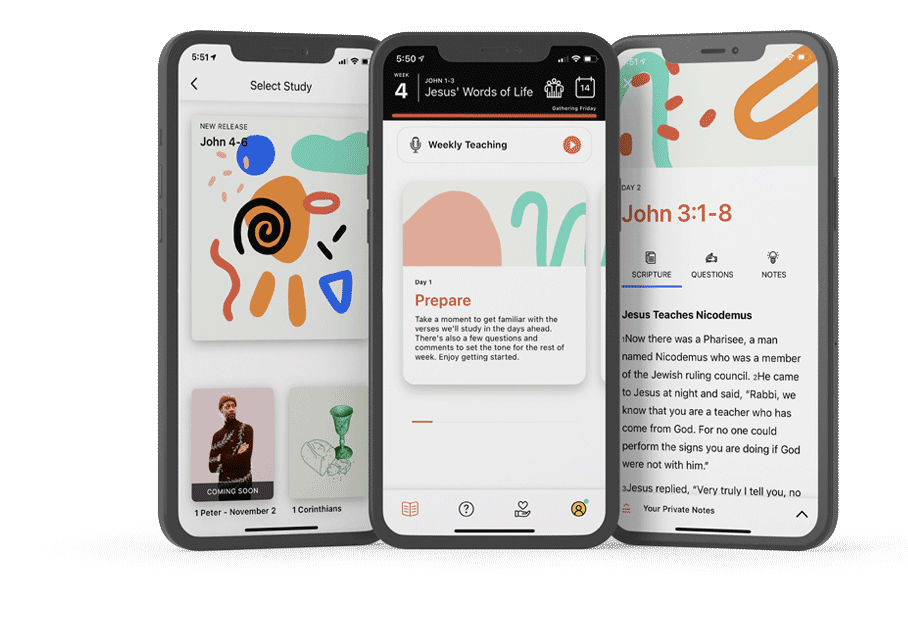
If you’re reading this article, you’ve probably already made the choice to prioritize God’s Word and invest in people. If so, you’ve chosen a high calling! The words of the Bible revive our souls and make us wise (Psalm 119:98); they are sweeter than honey and more precious than gold (Psalm 19:10). We simply cannot grow as Christians without knowing what the Bible says, interpreting what it means, and understanding how it applies to our lives.
Group Bible study resources are a great tool to help us do this together, but there are hundreds of them out there, and they are not all created equal. It can be easy to feel a bit overwhelmed about choosing the right material for your small group. So we’ve put together six indicators of a worthwhile Bible study, to help make the decision process a little less tricky for you. As you’re sifting through the mountain of materials already available on the market, it’s helpful to look out for resources that:
Sounds obvious, doesn’t it? But you might be surprised at how many study guides allow ample room for personal commentary, with minimal space given to Scriptural content. If you’re unsure whether or not a study is biblically grounded, watch out for how often the author asks you to refer to the Bible itself. You’ll soon identify which writers keep Scripture in central focus, rather than simply using isolated verses as proof texts for their own opinions. If you stick to Bible-centred materials, your life application will come straight from the passage, rather than from someone else’s experience.

Understanding the historical, social, political and religious context of a passage has a huge impact on grasping its meaning. Reading the Bible out of context is a bit like watching a play without the scenery in the background. The backdrop places the Bible’s events in sharper focus, helps to solve problems with interpretation, fills in gaps in our knowledge and confirms the accuracy of the biblical record. In short, it enriches and reinforces our faith! So look for Bible study resources that include some ‘behind-the-scenes’ knowledge, or at least direct you to where you can find that information.
Another study goal to aim for is a good balance of in-depth understanding and practical life lessons. This one is crucial, because our time in God’s Word shouldn’t just make us smarter; it should also make us sweeter in spirit and stronger in faith! Bible study isn’t merely about knowing what God says, but also living it out (James 1:22). A balance of factual and devotional material will encourage your group to grow in both knowledge and godly living.
Make sure your resource also includes questions that encourage you to dig deep and reflect, rather than simply offer straightforward answers. Comprehension questions are useful for summarizing the information in a passage, but reflective questions encourage us to engage in deeper discussion and wrestle with real-life application. For this reason, we recommend the inductive method of Bible study as a great way to engage at heart level. This approach asks three questions of every text:
- What’s actually there in the passage? (observation)
- What did it mean for the original audience who read or heard it? (interpretation)
- How do I live this out in my life? (application)
Let’s not forget, though, that even if a resource includes all of the above, it still needs to be realistic for you and your group. Before you commit to a course, be honest with yourself about the time you can commit to study as group leader. Look at the amount of ‘homework’ and decide whether the workload is achievable for you. Also consider that your small group members will have varying levels of free space in their schedules. For this reason, it’s a good idea to go for studies that are easily customizable.
Finally, the curriculum you select should be accessible and relevant for all of your small group members. You might find the who? what? where? when? why? questions useful for identifying the unique needs of your group:
Who?
Are most of you seekers, new believers, or mature Christians? If group members have limited biblical knowledge, for instance, a narrative study of John's gospel might be a better starting point than an in-depth analysis of Levitical law.
What?
What life events are your small group facing at the moment? Take time to ask and become familiar with their stories. If some of them are going through hard times, you could choose a study that will offer hope and perspective. If they are experiencing persecution in the workplace, a passage that deals with faith and work might be useful.
Where?
Are you meeting online or in-person? What works well sitting around a living room may not translate as well to a video call. You may need a larger bank of questions and conversation starters for an online platform, for instance.
When?
Are you gathering during a lunch break or for a whole evening? How long you have for each session and the time of day you’re meeting will determine how much content you can get through and how deep your conversations can get.
Why?
Lastly, it’s worth asking your group what they hope to gain from being there. During that conversation, you could present some options and ask each person for input before finally settling on a study!
Q1 Does it point to the Bible?
Q2 Does it include contextual insights?
Q3 Does it balance knowledge and application?
Q4 Does it ask the right questions?
Q5 Does it fit with your schedule?
Q6 Does it meet your group’s unique needs?

If you’re looking for a study resource that fits in your life, speaks to your needs, helps you go deep, and keeps you on track, why not check out the WordGo Bible study app? WordGo takes the incredible content of Bible Study Fellowship and makes it immediately accessible to you on a free app. You can choose from a growing library of studies, enjoy daily Scripture readings, customize your study plan, dive deeper with study notes, ask reflective questions and benefit from insightful teaching. Why not download the WordGo app today and join a community of thousands going deep in God’s Word together!



